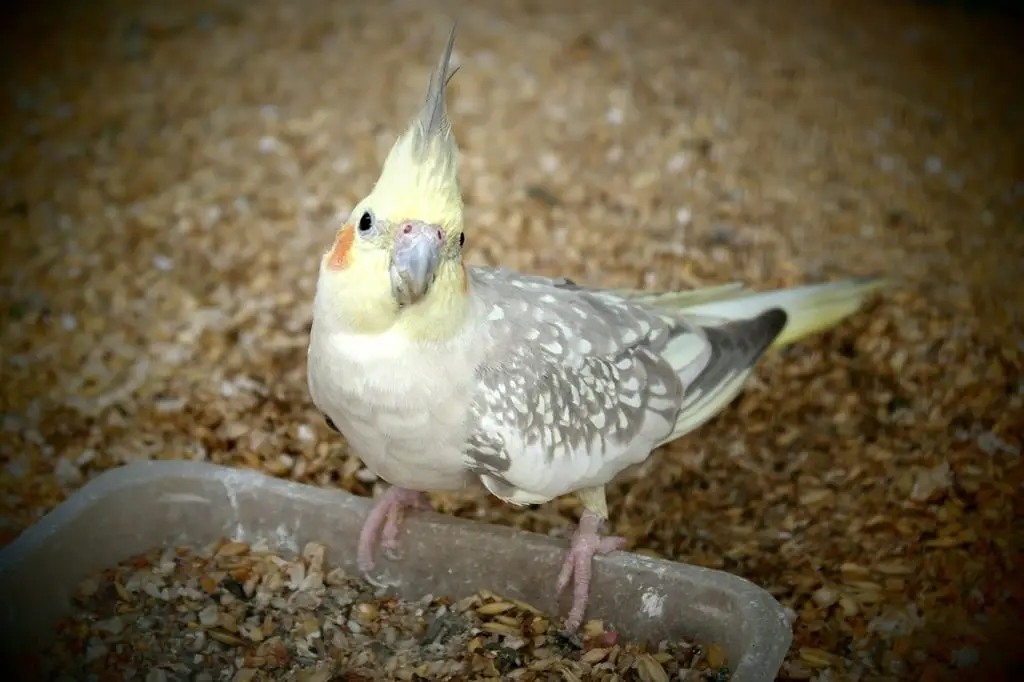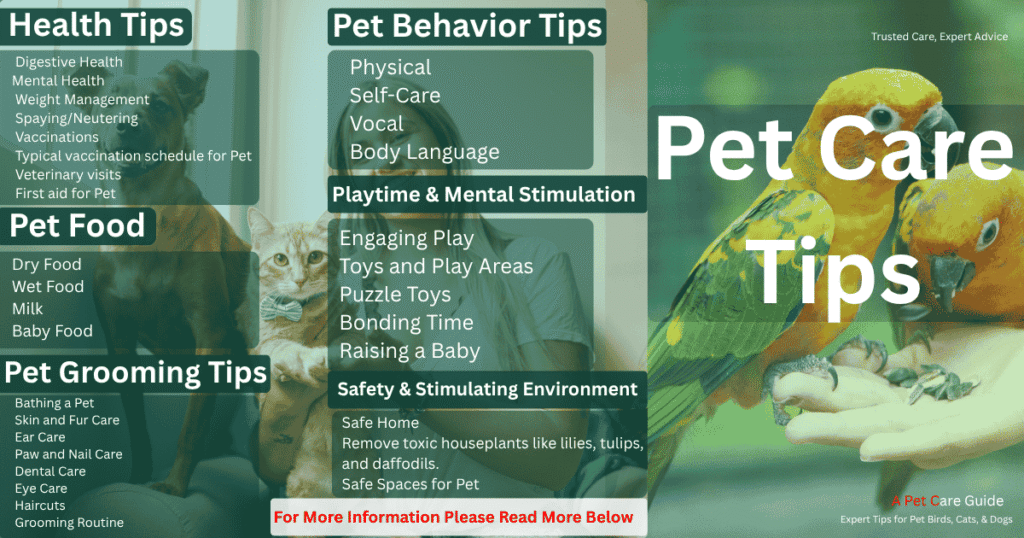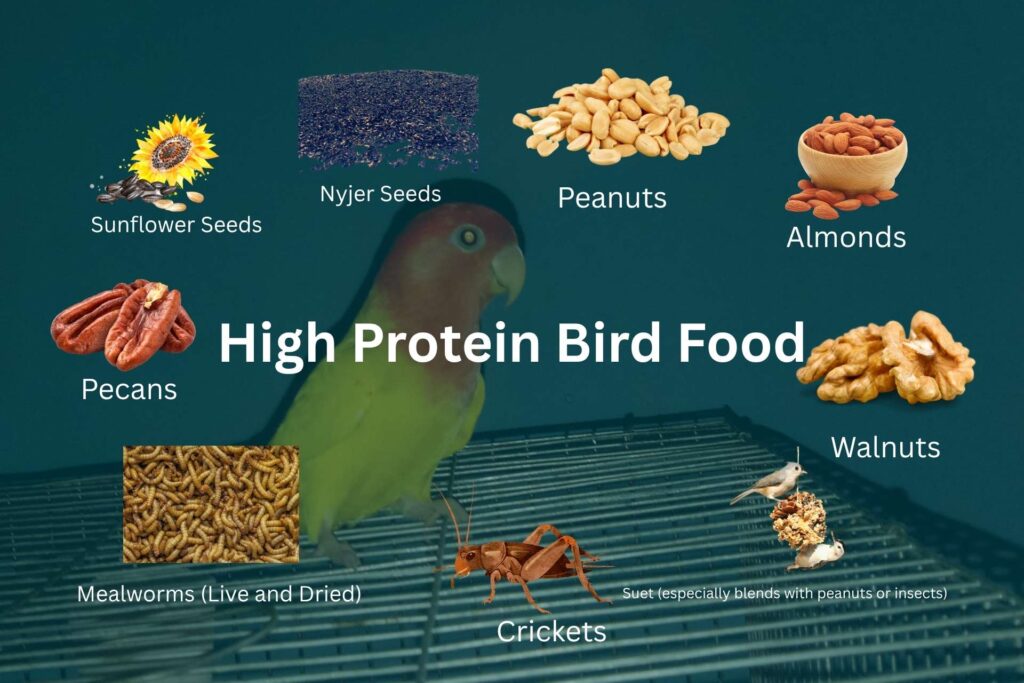Feeding your cockatiel the right foods is essential for its health and happiness. A balanced diet with fresh fruits, vegetables, seeds, and pellets ensures they get all the nutrients they need. Offering a variety of foods, you’ll keep their meals exciting and their body strong. Watching your cockatiel enjoy a nutritious meal is one of the joys of bird ownership, and it helps build a bond with your feathered friend.
I have some cockatiel birds, I give water, spinach, Long Bean, carrot’s mixers every morning at 11.00 AM. It is a lot of helpful for building their strong body for my pet cockatiel birds. Now, A Pet Care Guide is sharing a cockatiel bird food list chart for you.
The Ultimate Cockatiel Food List
Chart Guide
Fresh Food for Cockatiels
Fresh food is an important part of a cockatiel’s diet; fresh food provides them with the nutrition. They need to stay healthy and strong. When you feed your cockatiel fresh food, always make sure it’s clean and free of pesticides. You can offer a variety of vegetables and fruits every day to keep their meals exciting and nutritious.
Fresh food is not just about nutrition; it’s also about bonding with your bird. Watching them enjoy a fresh meal is one of the simple joys of bird ownership. Don’t forget to remove uneaten food at the end of the day to prevent it from spoiling.
Safe Vegetables for Cockatiels
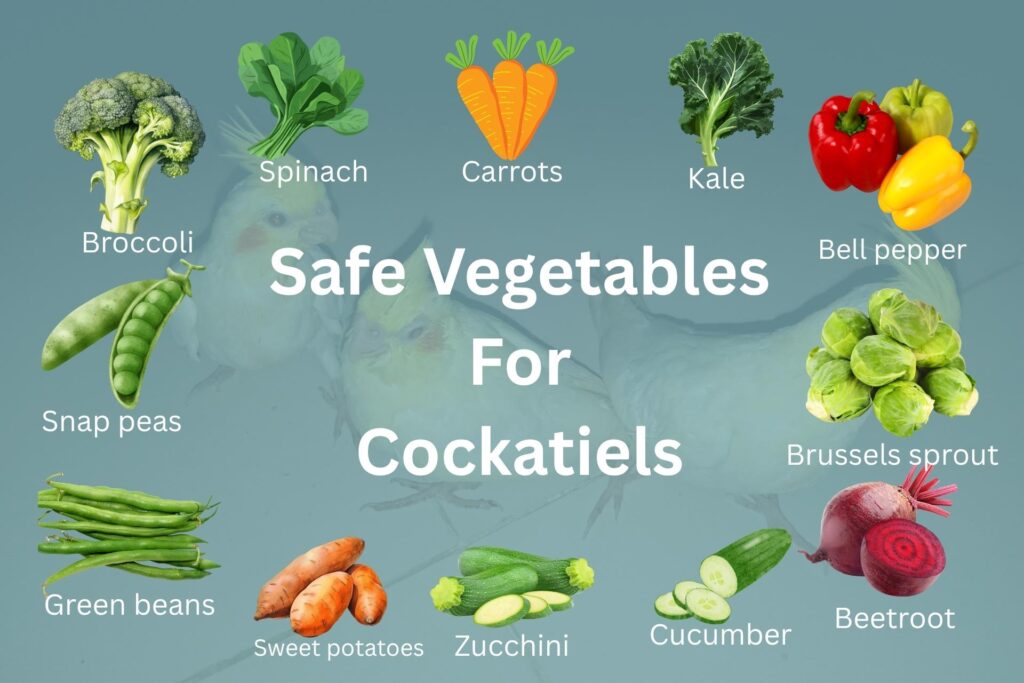
All pets need a balanced diet for a healthy and happy life. So, fresh vegetables are a wonderful addition to their meals, providing them with essential vitamins and minerals. That would be helpful for your cockatiel pet birds. When you offer vegetables to your cockatiel, it’s important to choose ones that are safe and beneficial for your beloved birds. I share a safe vegetable (Cockatiel bird food list chart) for your pet friends.
Here’s a list of safe vegetables for your cockatiel:
- Carrots
- Broccoli
- Spinach
- Sweet potato
- Peas
- Zucchini
- Bell peppers
- Kale
- Cucumber
- Squash
Safe Fruits for Cockatiels
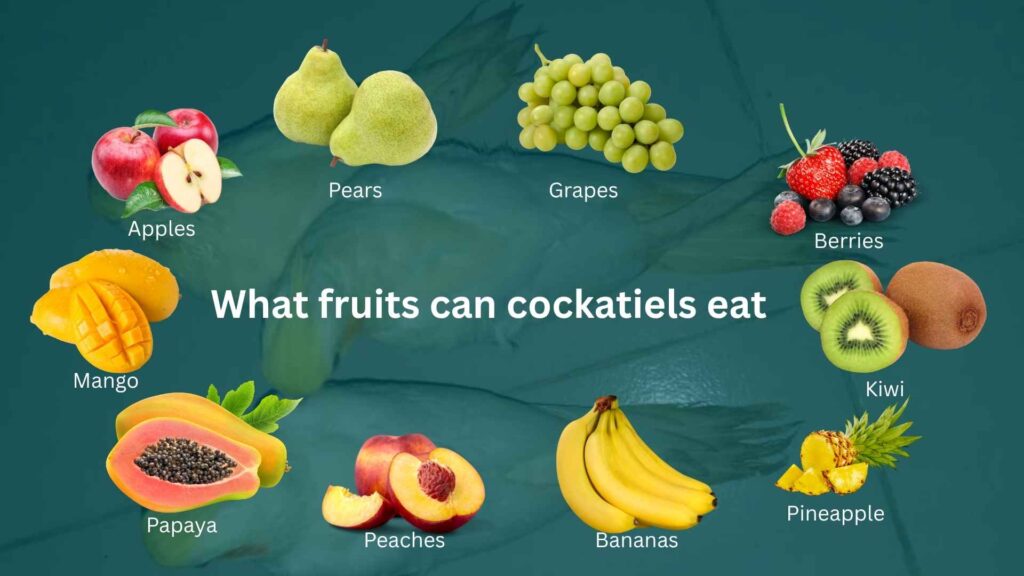
Fruits are a tasty treat for pet birds that cockatiels love, and they’re packed with nutrients. However, not all fruits are suitable for birds, so it’s important to know which ones are safe. Now I am sharing a safe fruit list (Cockatiel bird food list chart)
for your pet cockatiels.
Here’s a list of safe fruits for your cockatiel:
- Apples
- Pears
- Grapes
- Berries
- Mango
- Kiwi
- Papaya
- Peaches
- Pineapple
- Bananas
Safe Herbs for Cockatiels
Herbs can be a great addition to your cockatiel’s diet. Not only do they add variety, but they also bring some extra health benefits. When you introduce herbs, it’s essential to ensure they are safe and healthy for your feathered friend. Cockatiels enjoy herbs, and offering them can be a fun way to keep their meals exciting! Now I am sharing a safe herbs list (Cockatiel bird food list chart) for your pet cockatiels from my experience.
Here’s a list of safe herbs for your cockatiel:
- Basil
- Parsley
- Cilantro
- Thyme
- Oregano
- Dill
- Mint
- Sage
- Rosemary
- Lavender
Offering herbs to your cockatiel is a wonderful way to spice up their diet and keep them interested in their food. Just remember or keep your mind to provide herbs in moderation, as too much of anything can cause tummy troubles for your birds. When you prepare fresh herbs, always wash them thoroughly to remove any chemicals or pesticides that could harm your pet.
Safe Seeds for Cockatiels
Seeds are a favourite treat for cockatiels, also is favourite among all pet birds, like budgerigars, lovebirds, macaws, finches, etc. Keep your mind, you must make the right choice to keep them healthy. While seeds are a great source of energy, they should be given in moderation and alongside a balanced diet. Some seeds are packed with the nutrients your bird needs, while others should be avoided due to their high-fat content. Let’s make sure to provide only the best for our pet birds. Now I am sharing a safe seeds list (Cockatiel bird food list chart) for your pet cockatiels from my 2.5 years’ experience.
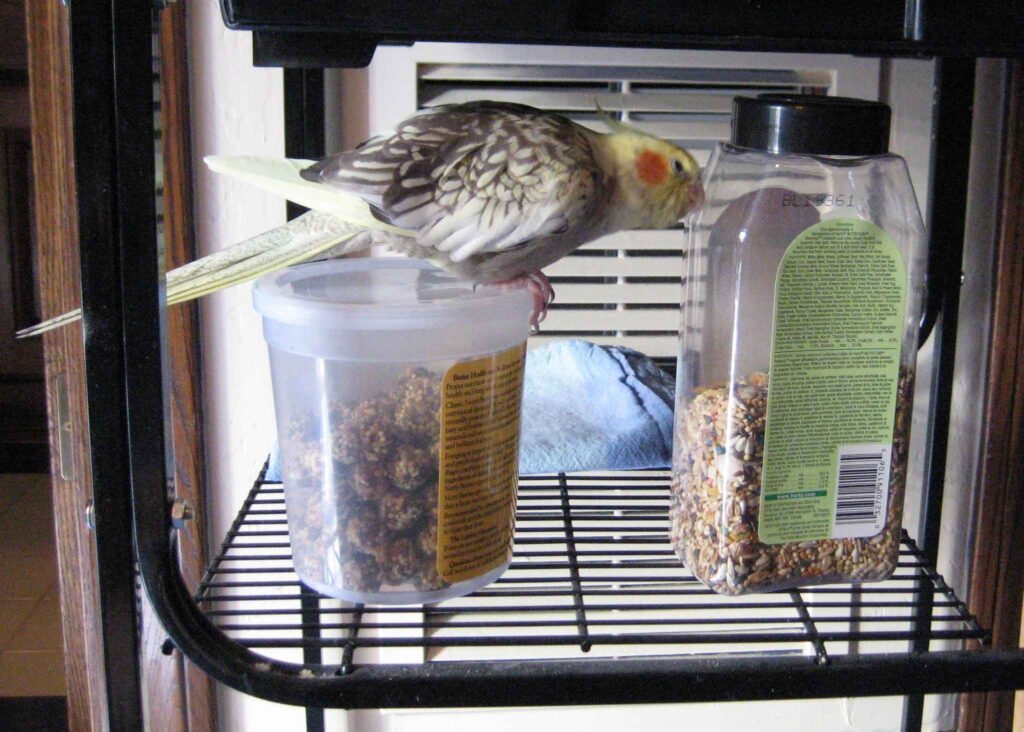
Here’s a list of safe seeds for your cockatiel:
- Millet
- Sunflower seeds
- Sesame seeds
- Flaxseeds
- Hemp seeds
- Pumpkin seeds
- Chia seeds
- Poppy seeds
- Canola
Seeds are a fantastic way to give your cockatiel a treat and a bit of extra energy throughout the day. Just keep you mind that those seeds shouldn’t be the main part of their diet, as they lack certain essential nutrients that fresh food provides. Keep their meals varied and balanced to ensure they live a long and healthy life!
Safe Nuts for Cockatiels
Nuts are a delightful and healthy treat for cockatiels, but it’s essential to choose the right ones for your loving birds. They are packed with good fats and nutrients. You should give nuts only occasionally, as they are calorie-dense. Giving your cockatiel nuts can be a thrilling way to spoil them, but moderation is key! I attest a safe nuts list (Cockatiel bird food list chart) for you from my experience.
Here’s a list of safe nuts for your cockatiel:
- Almonds
- Walnuts
- Hazelnuts
- Cashews
- Brazil nuts
- Pistachios
- Pine nuts
- Macadamia nuts
Nuts can bring a fun, crunchy experience to your bird’s diet, but don’t overdo it. Offering them as an occasional treat will keep your cockatiel happy and healthy, providing a boost of energy without overloading them with too much fat. Make sure to remove the shells when necessary to prevent choking hazards!
Human Foods for Cockatiels
When it comes to feeding our cockatiels, some human foods can be safely shared with them. While they might love a taste of what we eat, it’s important to be careful and choose foods that won’t harm them. Giving them human food can be a fun way to treat them. When you share human food with your pet birds, it can cause health problems for them. Therefore, be careful when offering food to cockatiels. However, sharing certain human foods can be beneficial for them and help save money. From my experience, I give a safe human food list (Cockatiel bird food list chart) below.
Here’s a list of safe human foods for your cockatiel:
- Cooked rice
- Whole-grain pasta
- Oatmeal
- Plain popcorn
- Boiled eggs
- Cooked potatoes
- Cheese
- Unsweetened yogurt
- Whole wheat bread
- Sweetcorn
Sharing these foods with your cockatiel can be a joyful experience, but always make sure they are free from harmful ingredients like sugar, salt, or spices. As a general rule, moderation is important. Keep their meals varied and exciting with these treats, and your cockatiel will be happy and healthy!
Pellets for Cockatiels
Pellets are an essential part of a cockatiel’s diet. They offer a balanced and complete source of nutrition that helps keep your bird healthy and strong. While fresh foods and treats are important, pellets can be relied on to provide your cockatiel with all the necessary vitamins and minerals. Introducing them into their meals can make feeding easier, ensuring they get the nutrients they need. I share my opinion about pellets.
Here’s a list of great pellet options for your cockatiel:
- High-quality cockatiel pellets
- Organic pellets
- Nutri-Berries
- Harrison’s Bird Foods
- Zupreem FruitBlend pellets
- Lafeber’s Premium Daily Diet
Pellets are a great foundation for your cockatiel’s diet, but don’t forget to add variety with fresh fruits, vegetables, and seeds. Offering a mix of foods ensures your cockatiel enjoys a delicious and balanced diet every day. Keep an eye on your bird’s health, and if you notice any changes, consult your vet for guidance on the best food choices.
Cooked Grains for Cockatiels
Cooked grains can be a wonderful addition to your cockatiel’s diet. They’re full of nutrients and provide variety, which is essential for keeping your bird healthy and happy. Adding cooked grains is a great way to offer them something different while making sure they get the right balance of energy.
Here’s a list of safe cooked grains for your cockatiel:
- Brown rice
- Oats
- Quinoa
- Barley
- Millet
- Buckwheat
Grains provide a healthy source of fiber and protein. When you cook them, make sure they’re soft and plain, with no added salt or seasoning. Offering a variety of these grains helps keep their meals exciting and nutritious! Your cockatiel will love the new textures and flavors while staying strong and healthy.
Full List Of Toxic & Unsafe Foods For Cockatiels – DO NOT FEED!
There are some foods that are simply not safe for cockatiels. Even though they might seem harmless to us, they can pose a serious risk to your bird’s health. It’s so important to avoid these foods to keep your feathered friend safe and sound. If you can avoid that, I share below. Your pet birds will be healthy & happy.
Avocado for Cockatiels
Avocado might seem like a healthy snack for humans, but it’s very dangerous for cockatiels. It contains a toxin called persin, which can cause serious health problems for birds. Even a small amount can make your cockatiel sick, so it’s best to avoid feeding it to them entirely. I share my opinion about why avocados are harmful to cockatiels.
Here’s why avocado is bad for cockatiels:
- Contains persin, a toxin harmful to birds
- It can cause heart damage
- May lead to respiratory distress
- Can result in vomiting and diarrhea
Chocolate for Cockatiels
Chocolate is something we all love, but unfortunately, it is extremely harmful for cockatiels. Not only cockatiels, it is all pet birds are harmed. It contains substances like theobromine and caffeine, which are toxic to birds and can cause serious health problems. Even a small amount of chocolate can make your cockatiel sick, so it’s important to keep it away from them at all times. From my experience, I give my opinion on why chocolate is bad for pets below.
Here’s why chocolate is bad for your cockatiel:
- Contains theobromine, which is toxic to birds
- Can lead to heart problems, seizures, or even death
- May cause vomiting and diarrhea
- Affects the nervous system and can lead to muscle tremors
It’s always best to avoid sharing chocolate with your bird. Stick to safe treats, and you’ll keep your cockatiel happy and healthy!
Fruit Seeds for Cockatiels
When it comes to feeding our cockatiels, it’s important to remember that not all fruit seeds are safe for them. Some seeds contain toxins that can be harmful, so it’s essential to know which ones to avoid. While fruits are a great treat, the seeds need to be carefully managed to ensure the health and safety of your bird. From my 2.5 years’ experience, I give my opinion on why fruit seeds are bad for pet birds below.
Here’s a list of fruit seeds to avoid for your cockatiel:
- Apple seeds
- Pear seeds
- Cherry pits
- Peach pits
- Plum pits
Even though these seeds may seem small, they can be dangerous to your cockatiel’s health. Always remove seeds and pits from fruits before offering them to your bird. Stick to safe, seedless fruits, and your cockatiel will enjoy a sweet, healthy snack!
Caffeine for Cockatiels
Caffeine is something most of us enjoy in our coffee or tea, but it’s extremely harmful for cockatiels and must be avoided. Caffeine is toxic to birds and can cause serious health issues. Even a small amount of caffeine can hurt your cockatiel, so it’s important to keep all caffeinated drinks and foods far away from them. From my 2.5 years’ experience, I give my opinion on why fruit caffeine is bad for pet birds below.
Here’s why caffeine is bad for your cockatiel:
- It can cause a rapid heart rate
- May lead to seizures
- Can cause restlessness and hyperactivity
- Leads to dehydration
- May cause vomiting or diarrhea
If you love your cockatiel, make sure it stays away from anything with caffeine in it. Instead, offer them fresh water, safe fruits, or veggies. They’ll appreciate the healthy alternatives, and you’ll have peace of mind knowing they’re safe.
High-Sugar, High-Salt Foods for Cockatiels
Cockatiels love to enjoy tasty treats, but it’s so important to avoid giving them high-sugar or high-salt foods. These types of foods can upset their delicate systems, leading to serious health issues. It’s always best to stick to natural, healthy treats to keep your cockatiel feeling its best.
Here’s a list of high-sugar, high-salt foods to avoid for your cockatiel:
- Chocolate
- Chips
- Processed snacks
- Pretzels
- Sweets or candy
- Fruit juices
- Canned food
- Packaged cereals
- Fast food
By keeping these unhealthy foods away from your cockatiel, you’ll help them live a longer, happier life. Stick to fresh fruits, vegetables, and safe seeds, and your feathered friend will feel healthier and more energetic!
Why They’re Harmful:
These foods are harmful because they can upset your bird’s digestion, cause kidney damage, and even lead to obesity. The extra sugar and salt in their diet can throw off the balance of their health, leading to serious long-term issues. It’s always best to offer fresh, natural treats that support your cockatiel’s well-being.
Onions and Garlic for Cockatiels
Onions and garlic may be common in our kitchens, but they can be dangerous for cockatiels. Even though they add flavour to our food, these foods are toxic to birds and can cause serious health problems. It’s important to keep them out of reach to avoid any accidental consumption.
Here’s why onions and garlic are harmful for your cockatiel:
- Onions contain compounds that can damage red blood cells, leading to anaemia.
- Garlic also contains toxins that affect the digestive and nervous systems.
- Both can cause stomach upset, lethargy, and weakness.
- Consuming either of these can result in long-term damage if eaten in large amounts.
As tempting as it may be to share your food, it’s crucial to remember that these ingredients are not safe for your cockatiel. Stick to safe, bird-friendly foods, and you’ll help keep your feathered friend healthy and strong.
Dairy Products for Cockatiels
Dairy products may be a common part of our diet, but they’re not good for cockatiels. Birds, especially cockatiels, have difficulty digesting dairy, and it can cause stomach problems or even more serious health issues. It’s best to avoid giving them any dairy at all.
Here’s a list of dairy products to avoid for your cockatiel:
- Milk (can cause digestive issues)
- Cheese (can lead to an upset stomach)
- Yogurt (high in lactose, hard to digest)
- Cream (rich in fat, difficult for birds to process)
- Butter (too fatty for their system)
Although we enjoy these foods, it’s important to remember that cockatiels cannot handle dairy well. Stick to fresh fruits, veggies, and other bird-friendly treats to keep them feeling their best!
Nutritionally Balanced Cockatiel Diet Overview (Diet Chart)
A balanced diet is essential for keeping your cockatiel happy and healthy. Their meals should include a variety of foods to meet all their nutritional needs. Now I give an idea about a Nutritionally balanced cockatiel’s diet using %. A good diet includes pellets (40%), which provide essential vitamins and minerals, and budgie seed mix (30%) for healthy fats and proteins. Vegetables (20%) like spinach and carrots add fiber and important nutrients. Fruits (5%) offer natural sugars and antioxidants, while treats (5%) can be offered sparingly to keep your cockatiel excited and engaged. Offering this mix ensures your bird stays vibrant, energetic, and full of life!
Food Safety & Preparation Tips for Cockatiel
Food safety and freshness are crucial for your cockatiel’s health. If you want to be healthy and happy, and safe, always check the food before serving it. A clean feeding area also ensures they stay healthy. Here I give some tips to keep their food safe and fresh:
- Check Freshness: Always make sure the food is fresh and not expired. Avoid giving spoiled food.
- Clean Dishes: Wash their food and water dishes every day to prevent bacteria.
- Proper Storage: Store food in airtight containers to keep it fresh longer.
- Wash Produce: Wash fruits and vegetables thoroughly to remove pesticides.
- Cut Food into Small Pieces: This makes it easier for your cockatiel to eat and enjoy their meals.
By following these simple steps, you’re helping your cockatiel stay healthy and energetic. Healthy meals make happy birds!
Tips for Cockatiel feeding
Feeding your cockatiel properly is important to keep it healthy and happy. You’ll want to pay close attention to their hydration and introduce new foods gradually. Here’s I give some tips on how you can do that:
- Hydration: Always provide fresh water for your cockatiel. Change their water every day to keep it clean.
- Introduce New Foods Slowly: When introducing new foods, do it gradually. Cockatiels might be picky, so it’s best to add small amounts of new items to their diet.
- Variety is Key: Make sure they get a mix of foods for a balanced diet, like seeds, fruits, and veggies.
- Watch for Reactions: Keep an eye on how they react to new foods. If they seem unwell, stop offering that food.
These simple tips can help keep your cockatiel hydrated and excited to try new foods while staying healthy!
Additional Care Tips for Cockatiels
Taking good care of your cockatiel goes beyond just feeding them properly. There are a few more things you should pay attention to for their overall well-being. Here are some additional care tips:
- Monitor Weight: Keep track of your cockatiel’s weight to make sure they’re not getting too heavy or too light. A healthy weight ensures they’re getting the right nutrition.
- Treats: Offer treats in moderation. Too many treats can lead to obesity, so make sure to balance them with their regular food.
- Consult a Veterinarian: Regular check-ups with a vet are essential for your cockatiel’s health. A vet can spot any health issues early and give you advice on how to keep them feeling their best.
By following these simple steps, your cockatiel will have the best care and remain healthy and happy!
Frequently Asked Questions: Food for Cockatiels
Are Dried Fruits Safe for Cockatiels?
Dried fruits can be given to cockatiels in moderation. Ensure they are unsweetened, free from preservatives, and offered as an occasional treat to avoid excessive sugar intake.
Can Cockatiels Eat Fruit Pits? Which Are Safe?
Some fruit pits, like those from apples, are safe in small amounts, but others, like those from cherries or peaches, contain toxins and should be avoided. Always remove pits before offering fruits.
How Much Food Do Cockatiels Need?
Cockatiels need about 1 to 2 tablespoons of pellets daily, along with fresh fruits, vegetables, and some seeds. Adjust portions based on their activity level and health.
What is a cockatiel’s favorite Food?
Cockatiels love a variety of fresh fruits like apples, berries, and grapes. They also enjoy leafy greens like spinach and kale, and sometimes seeds are a favorite treat. Already I share this on my Cockatiel bird food list chart.
Final Thoughts about the Cockatiel Bird Food List Chart
Feeding your cockatiel the right foods is key to keeping it healthy and happy. A balanced diet of fresh fruits, vegetables, seeds, and pellets will help them stay strong and energized. Offering a variety of foods keeps their meals exciting, which also makes feeding time more enjoyable for you. It’s not just about nutrition—watching your cockatiel enjoy fresh food creates a strong bond between you and your bird. Remember to keep their food clean and safe, and always offer fresh water. By following these simple steps, you’re giving your cockatiel the care it deserves for a long, joyful life.
